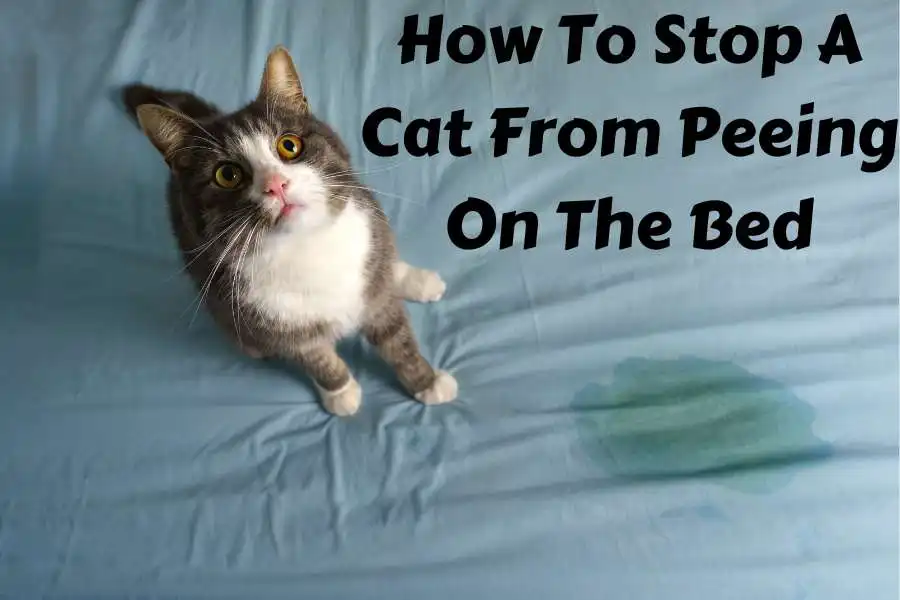Cats are our beloved pets and a part of the family in many homes worldwide, but they can be a bit annoying. And it doesn’t get more annoying than when they engage in inappropriate urination, such as peeing on your bed.
While they do this for different reasons, like sickness, an intact male or female looking for a mate, or when the cat is trying to communicate stress or displeasure with its litter box, a cat peeing on your bed is always annoying.
Of course, sleeping on sheets soaked in cat urine is uncomfortable and exposes one to dangerous disease-causing bacteria.
This article will delve into how to stop a cat from peeing on the bed in the short term and prevent it from happening again in the long term. The best way to stop your cat from peeing on your bed is to start by understanding the root cause of the issue.
Consequently, you can devise appropriate response strategies to resolve the problem and avert its reoccurrence.
Understand Why Your Cat Is Peeing On The Bed
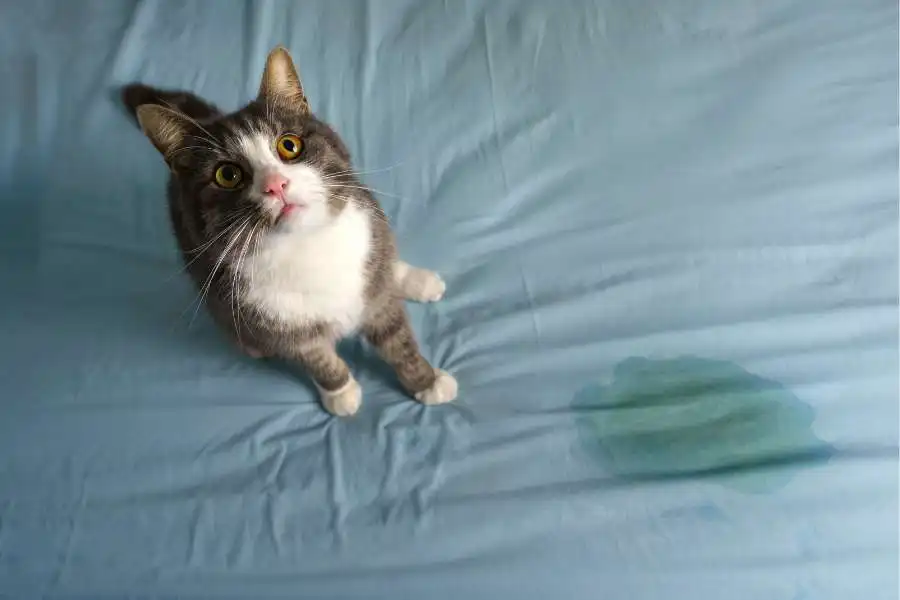
The first step in stopping your cat from peeing on the bed is to understand why it is doing so in the first place. Largely categorized between behavioral and medical reasons, cats may urinate on the bed for various reasons, such as:
- Medical issues.
- Stress and anxiety.
- Territorial marking.
#1. Medical Conditions
Certain illnesses impede the normal urine flow, subjecting the cat to pain or discomfort during urination. Such illnesses include:
- Urinary Tract Infection.
- Diabetes.
- Kidney stones or bladder stones
- Kidney disease – drinks more water and therefore urinates often. Difficulty concentrating their urine, thus urinating often.
Others include hyperthyroidism, liver disease, and Feline Interstitial Cystitis.
Some of the signs to look out for include:
- Consistently urinating outside the box.
- Drinking more water than normal.
- Urinating more frequently than normal.
- cry, meow, or other forms of vocalization when urinating.
- Loss of appetite.
- Licking its genital area.
- Constantly hiding.
- Loss of appetite.
- Abdominal tenderness
- Lethargy.
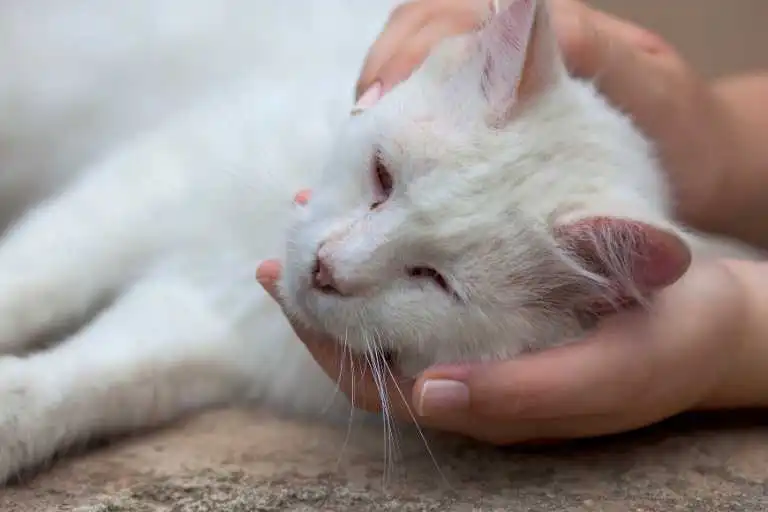
Unfortunately, the pain can make it difficult for the cat to get to the litter box on time or force it to look for soft and plush surfaces nearby to pee on, like your bed or pillow.
Besides being soft, the cat is attracted to your bed or pillow because they smell like you—an attempt to get your attention and tell you something is wrong.
Cats with urinary tract (or liver) illnesses may drink more water and urinate more frequently than usual. It is a catch-22 situation because frequent peeing causes the litter box to become dirty quickly, which leads to further litter box aversion, as cats do not like dirty litter boxes.
If your cat has suddenly started peeing on the bed, it is essential to rule out any underlying medical issues. Take your cat to the vet for a checkup to ensure they are healthy and receive treatment if necessary.
Indeed, a qualified and professional vet is best positioned to examine your cat’s health and address its needs.
Learn How To Stop Your Cat Peeing In The House
#2. Stress And Anxiety
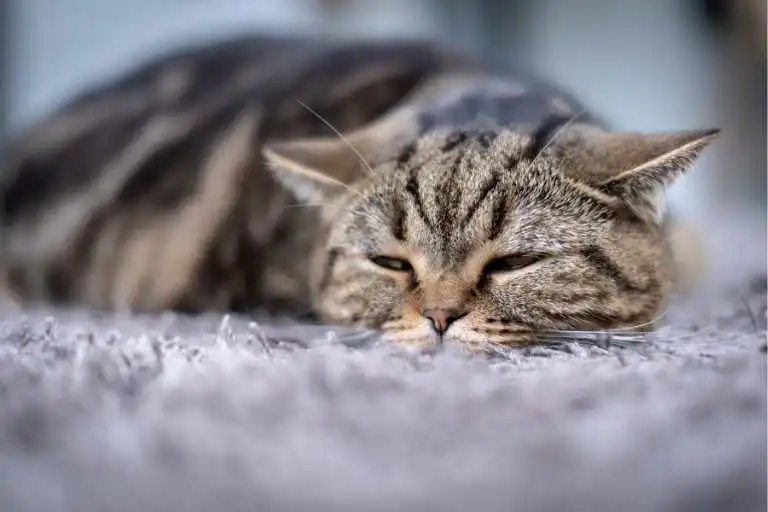
Fear, stress, and anxiety can also cause inappropriate cat urination. Cats may become stressed due to environmental changes, such as moving to a new home or adding a new pet.
Here are some of the common stress factors for pet cats:
- Drastic change in routine and diet.
- Inclusion of a new family member.
- Inclusion of a new pet, like a dog.
- Moving furniture or major items around the house.
- Relocating to a new home.
- Feeling threatened by other cats in the house or foreign cats.
- Loud appliances around your home, like refrigerators or furnaces, will likely frighten the cat.
- The cat dislikes the type of litter, the litter box, or where the litter box is located.
- A few litter boxes in a home with multiple cats.
However, providing adequate environmental enrichment, such as toys and scratching posts, can help reduce stress and prevent cats from peeing on the bed. You can learn more here.
Cat Territorial Spraying On Bed
Related to the above factor, cats exhibit territorial marking when exposed to stress, anxiety, or fear. Your cat may have started to pee on your bed suddenly as it is marking its own territory, especially if you have multiple cats in the household.
In some cases, cats spray familiar places to comfort themselves. If your cat is used to napping on your bed in normal times, when it is fearful, anxious, or stressed, it might spray the bed to enhance its comfort.
You Might Also Want To Learn How To Stop Cats Peeing On Your Clothes
How To Stop Cat Peeing On Beds
#1. Reduce Your Cat’s Access To Your Bedroom
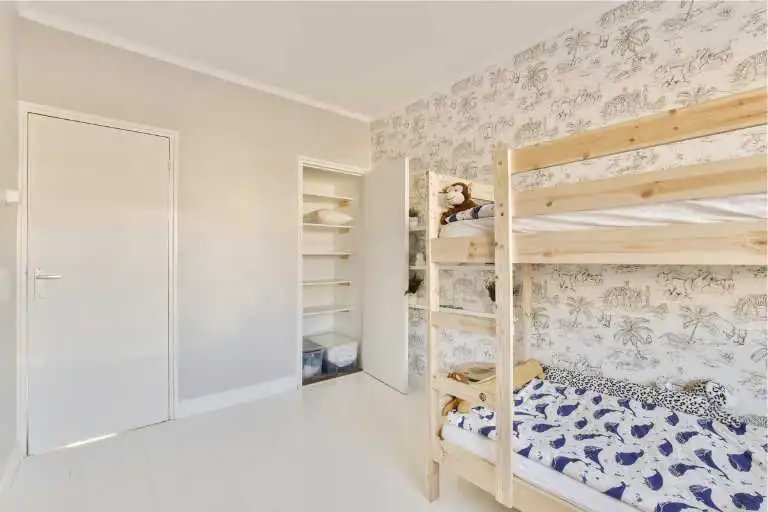
As much as it can be unnerving for your cat to be locked out of your bedroom and certain areas of the home, reducing its access to your bedroom is the most immediate solution to try.
Alternatively, consider covering your bed with a non-absorbent material like a shower curtain to protect it from urine moisture. Such material is less attractive to pee on. Importantly, the waterproofing properties will protect your bed.
You can also use a scat mat to startle the cat and deter it from getting on your bed when you are busy and cannot monitor your cat’s movement effectively.
Also, start giving treats and food to your cat on your bed; cats hate peeing where they eat. This way, you can help the cat psychologically disassociate the bed from its bathroom calls.
You Might Be Want To Learn How To Get Dog Pee Out Of Bedding
#2. Ensure Your Cat Has An Appropriate And Clean Litter Box Placed In The Right Location
Cats are clean animals and prefer using a clean litter box. If the litter box is dirty or has a strong odor, your cat may choose to urinate on the bed instead. Ensure the litter box is cleaned regularly and is filled with the appropriate litter up to the required depth.
Also, you can place a litter box in your bedroom to help the cat feel part of the social setup.
#3. Try Different Types Of Litter And Depths Of Litter
Cats are picky about the type of litter they use. Some cats prefer fine-grained, clumping litter, while others prefer large-grained, non-clumping litter. Other cats like sandy or clay-based litter, unorthodox wood pellets or plant-based litter, or crystals.
In most cases, cats prefer unscented litter. Try changing the litter type to see if it makes a difference.
The ideal depth of the litter should be 6 cm. Cats are programmed to bury their waste as a survival strategy, so a predator cannot locate it. To a cat, burying its waste is close to life and death. Shallow litter can be stressful for the cat and lead to litter box aversion.
However, the litter must not be too thick, as many cats avoid using litter with a depth of more than 2 inches.
Learn How To Get Rid Of Dog Pee From Your Mattress
#4. Provide Multiple Litter Boxes
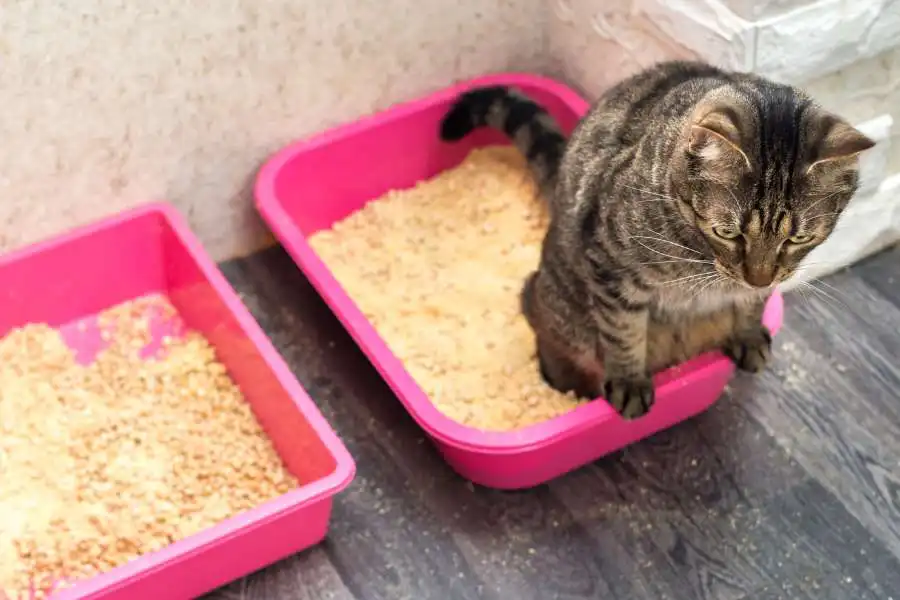
Providing enough litter boxes for each cat is essential if you have multiple cats. Each cat should have at least one litter box, and there should be an additional one. For example, if you have three cats, invest in 4 litter boxes.
This way, your cats won’t have to compete for the litter box, which often causes stress and leads to inappropriate urination. This way, your cats won’t have to compete for the litter box, which can cause stress and lead to inappropriate urination.
If you have the space, you can provide two litter boxes for each cat. It is not uncommon for cat owners to provide two litter boxes for each cat.
#5. Size And Type Of Litter Box
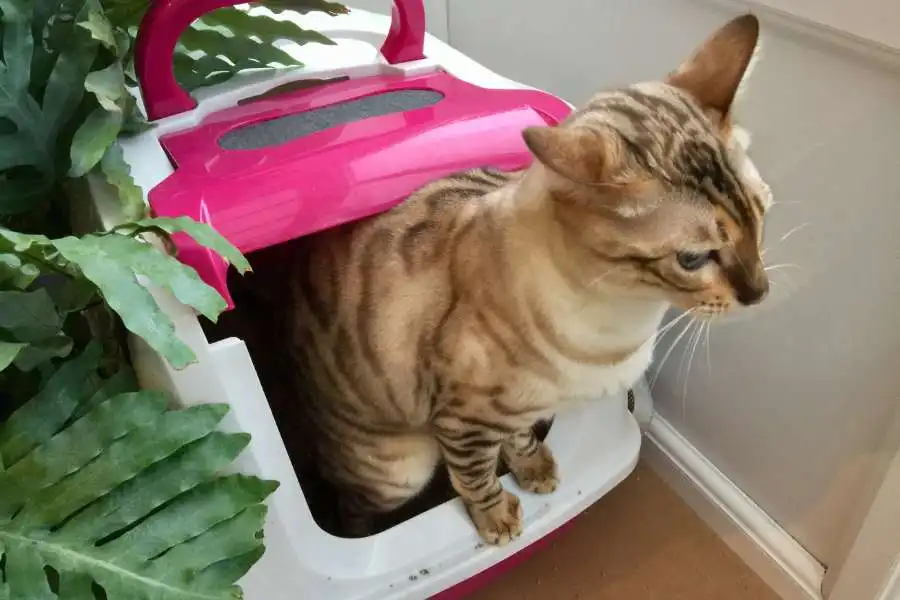
Aside from situating the litter boxes in accessible locations, you should invest in the right ones for your cat.
Your cat needs a big enough litter box to dig comfortably, turn around, and squat. Cats are hard-wired to bury their waste, and a small litter box can make it difficult for them to move around and bury their waste, leading to litter box aversion.
Ordinarily, the litter box should be at least 1.5 times the length of the cat. Additionally, ensure the design of the litter box enables the cat to use it comfortably.
Try different types, designs, or brands of litter box styles. Some cats prefer covered litter boxes for increased privacy, while others prefer open ones. Experiment with different litter boxes to see which one your cat prefers.
Also, consider the special requirements of your cat. For instance, a litter box with high sides can hinder free entry into the box. The height of the litter box entryway is particularly important for elderly or arthritic cats that may have joint problems.
Experiment with different litter boxes to find the one your cat prefers or can use easily.
#6. Provide Adequate Environmental Enrichment
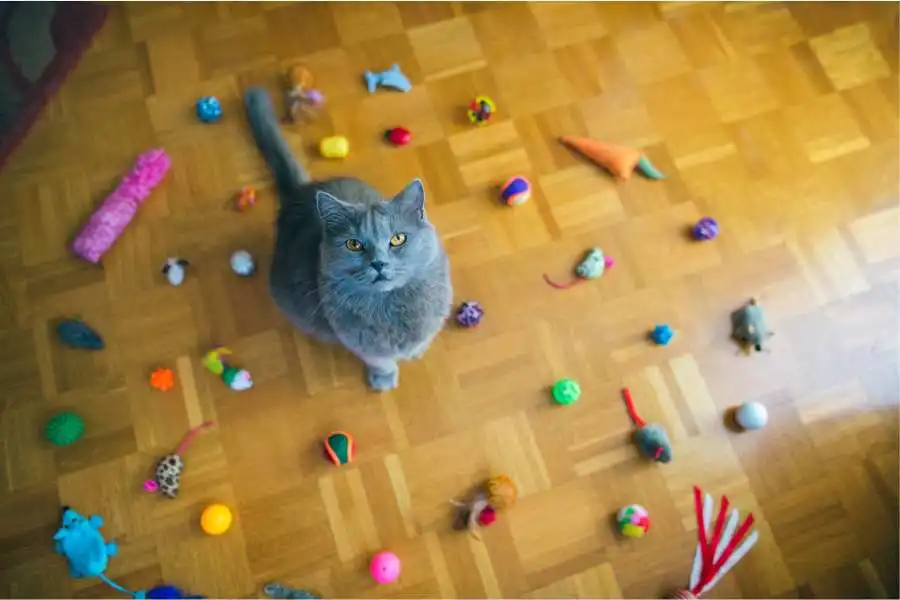
Cats are natural hunters and require environmental enrichment to stay mentally stimulated. Provide your cat with toys that interest them, scratching posts, and other forms of enrichment to keep them busy and entertained. This can reduce stress and prevent your cat from peeing on the bed.
#7. Prioritize Removing The Triggers – Clean The Urine Stains Promptly
If your cat has peed on the bed, it is essential to clean the urine stains thoroughly. Use an enzymatic cleaner like Nature’s Miracle or Urine Away to remove the smell and prevent your cat from peeing on the bed again. Furthermore, cleaning the urine stains from your beddings and/or your mattress as soon as possible is crucial for preventing the odor from setting in.
It is best to avoid cleaning products containing ammonia, which smells like cat urine and is likely to attract the cat to pee on the bed again.
Other stress factors include the smell of foreign cats entering your home. You may need to block the windows to prevent the entry of other cats’ smells.
#8. Use A Cat Deterrent

If all else fails or is inappropriate for your situation, consider using a cat deterrent to stop your cat from peeing on the bed. Several cat deterrents are available, such as repellant sprays, human scat mats, and noise deterrents. These products can help deter your cat from urinating on the bed.
While not always the best solution, you can use essential oils as a deterrent. Read more on this topic in this article, delving into using essential oils to deter cats from scratching. Alternatively, you can use citrus or lemon peel to deter the cat from the bed; cats hate the smell of citrus.
#9. Have Him Neutered (Or Spayed, For The Ladies)
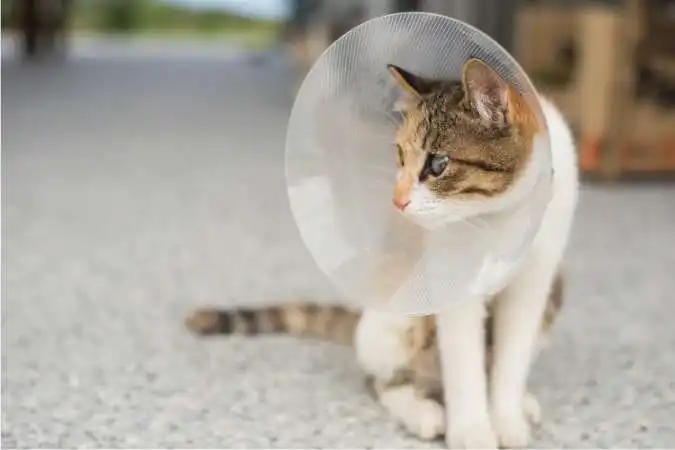
Intact cats, particularly males, are more likely to spray and leave urine marks than neutered or spayed cats. A female cat will mark around the home to communicate her availability to mate. In this case, urine marking or spraying occurs when the cat is in heat and trying to attract a mate.
If your cat is peeing on your bed, consider spaying or neutering them to control urine-marking behavior.
Besides controlling marking, spaying or neutering comes with other benefits. For females, spaying helps reduce the need to roam around, lowers the risk of ovarian and uterine cancer, promotes good health, and increases longevity.
#10. Spend More Time With Your Cat
Sometimes the cat is urinating on your bed as an act of aggression in search of attention or some playtime. Giving the cat extra attention can calm its mind and provide the positive response you seek. Here are some ideas for keeping your cat entertained and stimulated.
- Chatting to your cat.
- Exercising your cat, playing chase, or any interactive play can help.
- Cat toys like feather wands, crumpled paper, balls of yarn, and toy mice.
- Providing a cat tree with elevated resting places.
- Providing hiding places in the house for when the cat feels insecure or threatened.
- Clicker training or positive reinforcement. Acknowledge good behavior in your cat.
- The vet may recommend putting your cat on stress and anxiety medication.
- Use Feliway diffuser product to calm the cat and minimize stress.
Final Thoughts On How To Stop A Cat From Peeing On The Bed
Stopping your cat from peeing on the bed can be challenging, but it is essential to maintaining a clean and healthy living environment for both you and your cat. Understanding why your cat is peeing on the bed and addressing the underlying cause can prevent inappropriate urination and ensure your cat’s health and well-being.
In summary, here are the key takeaways from this article on how to stop cats from peeing on the bed:
- Understand why your cat is peeing on the bed, such as medical issues or stress.
- Ensure your cat has a clean litter box, and try different types of litter if necessary.
- Provide multiple litter boxes if you have multiple cats.
- Provide adequate environmental enrichment to keep your cat mentally stimulated.
- Clean urine stains thoroughly and use a cat deterrent if necessary.
- Avoid yelling or punishing your cat for peeing on your bed, which will likely aggravate the situation.
Following these tips, you can prevent your cat from peeing on the bed and maintain a happy and healthy relationship with your feline companion.
FAQs:
Q: What are some common reasons why cats pee on the bed?
A: Medical issues, stress, dirty litter boxes, and territorial marking are common reasons cats may pee on the bed.
Q: How can I tell if my cat is experiencing a medical issue causing them to pee on the bed?
A: Look for signs such as frequent urination, straining to urinate, blood in the urine, or changes in appetite or behavior. If you suspect a medical issue, take your cat to the vet.
Q: What can I do if my cat continues to pee on the bed despite trying these solutions?
A: If your cat continues to pee on the bed despite your efforts to deter the behavior, consider consulting with a veterinarian or a professional animal behaviorist for additional guidance.
Q: Is it okay to punish my cat for peeing on the bed?
A: No, punishing your cat for peeing on the bed is ineffective and can make the behavior worse. Instead, focus on addressing the underlying cause of the behavior.
Q: How can I clean urine stains on my bed?
A: Use an enzymatic cleaner specifically designed for cat urine, and follow the instructions carefully. Avoid using ammonia-based cleaners, as they can worsen the odor and encourage cats to urinate in the same spot again.
Q: Can cats be trained to use the toilet instead of a litter box?
A: While some cats can be trained to use a toilet, it is not recommended for most cats. Using a litter box is more natural and allows for better monitoring of your cat’s health.

